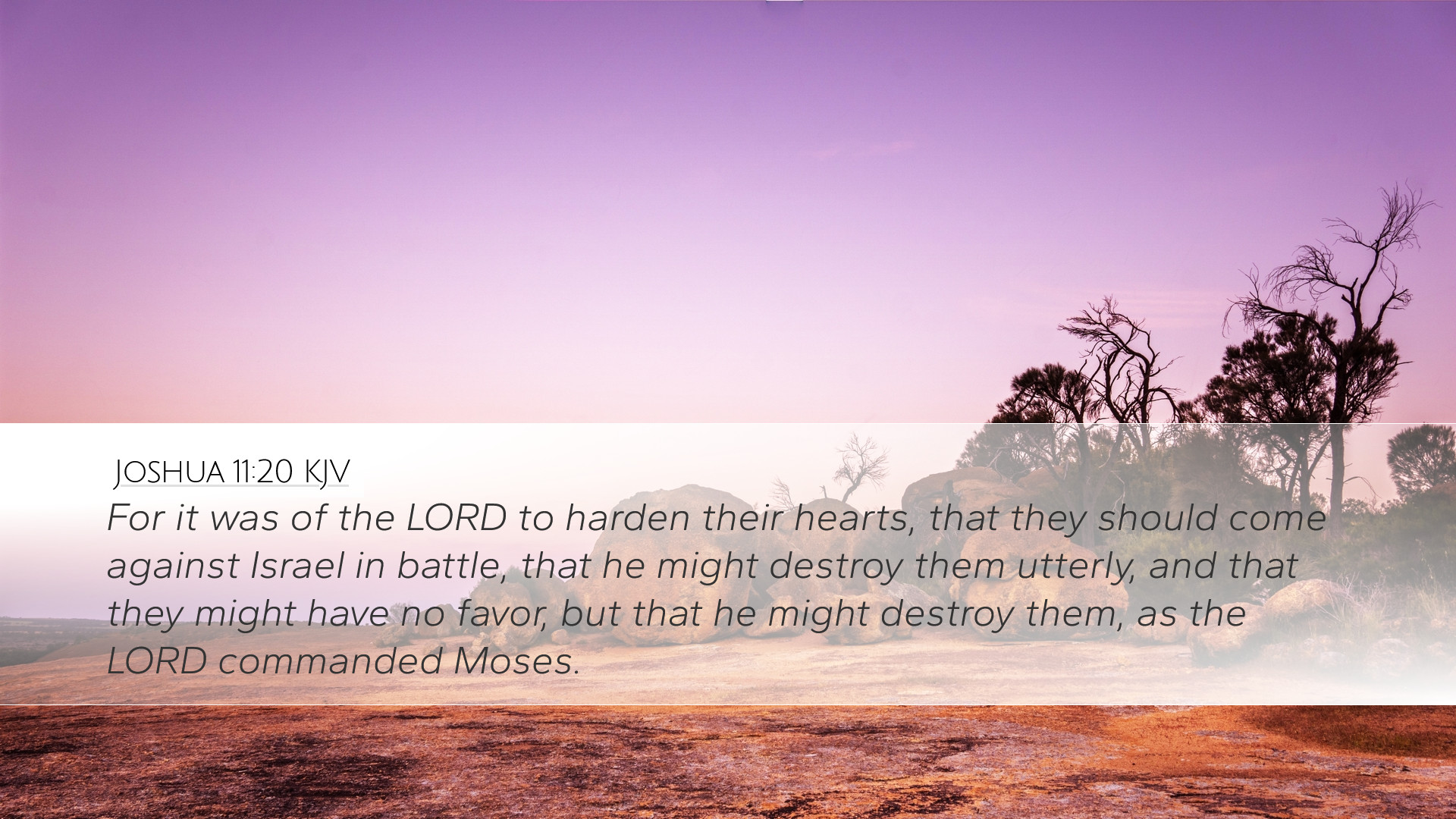Old Testament
Genesis Exodus Leviticus Numbers Deuteronomy Joshua Judges Ruth 1 Samuel 2 Samuel 1 Kings 2 Kings 1 Chronicles 2 Chronicles Ezra Nehemiah Esther Job Psalms Proverbs Ecclesiastes Song of Solomon Isaiah Jeremiah Lamentations Ezekiel Daniel Hosea Joel Amos Obadiah Jonah Micah Nahum Habakkuk Zephaniah Haggai Zechariah MalachiJoshua 11:20
Joshua 11:20 KJV
For it was of the LORD to harden their hearts, that they should come against Israel in battle, that he might destroy them utterly, and that they might have no favor, but that he might destroy them, as the LORD commanded Moses.
Joshua 11:20 Bible Commentary
Bible Commentary on Joshua 11:20
Joshua 11:20 states: "For it was of the Lord to harden their hearts, that they should come against Israel in battle, that he might destroy them utterly, and that they might have no favor, but that he might destroy them, as the Lord commanded Moses."
Introduction
This verse provides a profound insight into the dealings of God with the nations of Canaan during the conquest by Israel. It underscores the divine sovereignty of God in orchestrating the events leading to Israel's victory, as well as the hardening of hearts of the Canaanite kings. This commentary will draw from the insights of Matthew Henry, Albert Barnes, and Adam Clarke, offering a comprehensive understanding of this pivotal moment in biblical history.
Divine Sovereignty and Human Responsibility
Matthew Henry emphasizes that the hardening of the hearts of the Canaanites was a divine act. He notes that God, in His sovereignty, can harden hearts to fulfill His divine purposes. The Canaanites’ antagonism towards Israel was not merely a result of natural human rebellion but a part of God’s predetermined plan to bring judgment upon them. Henry writes, “When God’s judgments are about to follow, there is often a judicial blindness given to those who oppose Him.”
Albert Barnes echoes Henry's sentiment, discussing the nature of divine hardening. He clarifies that while God is sovereign over the actions of men, it does not negate their responsibility. Barnes points out that the hardening of their hearts indicates that they had already nurtured a spirit of defiance against God, which was then cemented by divine intervention. This interaction between divine sovereignty and human free will raises significant theological discussions on predestination and moral accountability.
The Purpose of Hardening
The text reveals that the hardening of Canaan's hearts had a specific purpose: to lead them to battle against Israel, thereby facilitating their utter destruction. Adam Clarke elaborates on this by suggesting that God allowed their hearts to be hardened to prepare the stage for a conclusive demonstration of His power and to ensure that His commands to Moses regarding the destruction of the Canaanite nations were fulfilled. Clarke states, “The hardening was not arbitrary but aimed at obtaining the glory and justice of God in the execution of His plan.”
This raises questions about God's justice in hardening hearts. If God actively influences the will of these kings, how can they be held accountable for their actions? Matthew Henry further explains that God’s hardening does not compel them to sin against their will but confirms them in the wickedness they have chosen. Their destruction becomes the outcome of their own sinfulness, despite God using their choices for His purposes.
God's Judgement and Mercy
The destruction of the Canaanites poses a challenge for understanding God's justice and mercy. Albert Barnes asserts that the Canaanites were engaged in gross idolatry and immorality, which warranted their judgment. God, in His mercy, had given them ample opportunity to repent through the lengthy period of Israel’s journey to the promised land. The hardening also serves as a fulfillment of God’s long-standing promise to Israel that He would deliver their enemies into their hands.
Implications for Believers Today
Understanding this verse provides profound implications for contemporary believers. First, it underscores the importance of aligning one’s life with God’s will. Faithfulness to God’s commands is paramount, as demonstrated through the actions of Israel in following the directives given to Moses.
Second, it also serves as a warning against spiritual indifference. Just as God hardened the Canaanites’ hearts, there is a danger today of becoming callous against the truth and the leading of the Holy Spirit. Adam Clarke warns that repeated resistance to God’s voice can lead to a state where one can no longer respond to His prompting.
Lastly, this scripture illustrates God's divine orchestration in the affairs of humankind. While it may appear that evil prevails, ultimately, God is in control, fulfilling His promises and exercising justice.
Conclusion
Joshua 11:20 encapsulates critical theological themes about divine sovereignty, judgment, and human responsibility. The commentaries from Matthew Henry, Albert Barnes, and Adam Clarke reveal the complexity of God's actions in human history while providing a sober reminder of the need for faithfulness to God’s commands. As believers reflect on this passage, they are called to remain vigilant and responsive to divine truths, recognizing that God is orchestrating a larger narrative for His glory and the benefit of His people.


